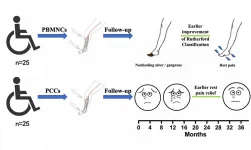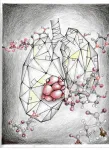(Press-News.org) Five years after the Paris climate agreement, all eyes are on the world's progress on the road to a carbon-free future. A crucial part of this goal involves the energy transition from fossil fuels to renewable sources, such as sun, water, wind and wave energy. Among those, solar energy has always held the highest hope in the scientific community, as the most reliable and abundant energy source on Earth. In recent decades, solar cells have become cheaper, more efficient, and environment friendly. However, current solar cells tend to be opaque, which prevents their wider use and integration into everyday materials, constrained to being lined up on roofs and in remote solar farms.
But what if next-generation solar panels could be integrated to windows, buildings, or even mobile phone screens? That is the hope of Professor Joondong Kim from the Department of Electrical Engineering at Incheon National University, Korea. In a recent END
On the road to invisible solar panels: How tomorrow's windows will generate electricity
A new study led by scientists from Incheon National University in Korea shows how to make a fully transparent solar cell
2021-01-05
ELSE PRESS RELEASES FROM THIS DATE:
Machine learning improves particle accelerator diagnostics
2021-01-05
Operators of the primary particle accelerator at the U.S. Department of Energy's Thomas Jefferson National Accelerator Facility are getting a new tool to help them quickly address issues that can prevent it from running smoothly. A new machine learning system has passed its first two-week test, correctly identifying glitchy accelerator components and the type of glitches they're experiencing in near-real-time.
An analysis of the results of the first field test of the custom-built machine learning system was recently published in Physical Review Accelerators and Beams.
The Continuous Electron Beam Accelerator Facility, ...
New bacterial culture methods could result in the discovery of new species
2021-01-05
Microorganisms are the most abundant and diverse form of life on Earth. However, the vast majority of them remain unknown. Indeed, only a small fraction of the microorganisms of our planet can be cultured under traditional conditions, leaving a world of unculturable organisms out of our scope. This is especially true for bacteria thriving under extreme conditions as the harsh conditions are hardly reproducible in a lab. While some microbial studies have been performed in the Sahara, the Atacama, and the Gibson desert, European arid lands remain poorly studied.
To finally explore the microbial community of some European deserts, researchers ...
How to motivate people to follow restrictions: 13 principles for COVID-19 communication
2021-01-05
An effective response to a pandemic like the COVID-19 will only be successful if people voluntarily follow the rules and guidelines of decision-makers and experts. Many of the required measures, such as avoiding social contact and significantly changing our daily habits require a strong commitment. Other necessary actions, such as regular hand washing, are often impossible to monitor and enforce. Adherence to the guidelines thus depends on people's personal commitment.
The ability of policy makers and experts to communicate convincingly to citizens has a strong influence on whether ...
Using solar energy and agriculture to limit climate change, assist rural communities
2021-01-05
CORVALLIS, Ore. - Co-developing land for both solar photovoltaic power and agriculture could provide 20% of total electricity generation in the United States with an investment of less than 1% of the annual U.S. budget, a new paper by Oregon State University researchers found.
Wide-scale installation of agrivoltaic systems could lead to an annual reduction of 330,000 tons of carbon dioxide emissions in the U.S - the equivalent of 75,000 cars off the road per year - and the creation of more than 100,000 jobs in rural communities, while minimally impacting crop yield, the researchers say.
"Agrivoltaics provide a rare chance for true synergy: more food, more energy, lower water demand, lower carbon emissions, and more prosperous rural communities," said Chad Higgins, an associate ...
Mid-term clinical trial results show similar outcomes in promising cell therapies for CLI
2021-01-05
Durham, NC - Mid-term results of the first clinical trial designed specifically to evaluate the safety and effectiveness of two cell therapies that are showing early promise in treating angiitis-induced critical limb ischemia were released today in STEM CELLS Translational Medicine. The study, by researchers at Zhongshan Hospital/Fudan University in Shanghai, compared how transplantation of peripheral blood mononuclear cells fared versus transplantation of purified CD34+ cells in treating this condition.
It revealed both therapies yielded satisfactory results and provided evidence for ...
Researchers uncover a potential treatment for an aggressive form of lung cancer
2021-01-05
DALLAS - Jan. 5, 2021 - Researchers at the Children's Medical Center Research Institute at UT Southwestern (CRI) have discovered a new metabolic vulnerability in a highly aggressive form of non-small cell lung cancer (NSCLC). These findings could pave the way for new treatments for patients with mutations in two key genes - KRAS and LKB1. Patients whose tumors contain both of these mutations, known as KL tumors, have poor outcomes and usually do not respond to immunotherapy.
"We used to think that most tumors rely on the same handful of metabolic pathways to grow, but we've learned over the last decade that this is an oversimplification. Instead, different tumor subclasses have particular metabolic needs arising from mutations ...
COVID-19 news from Annals of Internal Medicine
2021-01-05
Trio of articles suggest that a single dose of vaccine, even if less effective than two doses, may have greater population benefit.
Three articles published today in Annals of Internal Medicine discuss the most effective vaccination strategy for maximum impact against the COVID-19 pandemic. The articles are accompanied by an editorial from Thomas J. Bollyky, JD, Director of Global Health Program, Council on Foreign Relations. Mr. Bollyky can be reached through Lauran Potter at lpotter@cfr.org. The full text of his editorial is available here: https://www.acpjournals.org/doi/10.7326/M20-8280.
Speed Versus Efficacy: Quantifying Potential Tradeoffs in COVID-19 Vaccine Deployment https://www.acpjournals.org/doi/10.7326/M20-7866.
Researchers from Yale School of Public ...
Ibrutinib with rituximab in previously untreated CLL: indication of added benefit over FCR
2021-01-05
The combination of ibrutinib plus rituximab is approved for the treatment of adults with previously untreated chronic lymphocytic leukaemia (CLL). In an early benefit assessment, the German Institute for Quality and Efficiency in Health Care (IQWiG) now examined which advantages and disadvantages this drug combination has for the patients. For patients who could also be treated with the chemo-immunotherapy FCR, the assessment found an indication of a major added benefit in comparison with this appropriate comparator therapy. No study data are available for patients for whom FCR or other chemo-immunotherapy is not an option due to their poorer general health. An added benefit is therefore ...
Rare footage captured of jaguar killing ocelot at waterhole
2021-01-05
PULLMAN, Wash. - In what may be a sign of climate-change-induced conflict, researchers have captured rare photographic evidence of a jaguar killing another predatory wild cat at an isolated waterhole in Guatemala.
In the footage, a male jaguar arrives near the waterhole and apparently lies in wait for an hour. It lets a potentially dangerous prey animal, a large tapir, pass by, but when the ocelot stops to drink, the jaguar pounces and carries off the smaller predator.
The event, detailed in a recent study published in the journal Biotropica, was captured in the Maya Biosphere Reserve in March 2019, a dry month in a drought year for the tropical forest, by wildlife ecologists from Washington State University ...
New clues why gold standard treatment for bipolar disorder doesn't work for majority of patients
2021-01-05
LA JOLLA--(January 5, 2021) Lithium is considered the gold standard for treating bipolar disorder (BD), but nearly 70 percent of people with BD don't respond to it. This leaves them at risk for debilitating, potentially life-threatening mood swings. Researchers at the Salk Institute have found that the culprit may lie in gene activity--or lack of it.
A new study led by Salk Professor and President Rusty Gage, which published in the journal Molecular Psychiatry on January 4, 2021, shows that decreased activation of a gene called LEF1 disrupts ordinary ...
LAST 30 PRESS RELEASES:
Jeonbuk National University researchers explore metal oxide electrodes as a new frontier in electrochemical microplastic detection
Cannabis: What is the profile of adults at low risk of dependence?
Medical and materials innovations of two women engineers recognized by Sony and Nature
Blood test “clocks” predict when Alzheimer’s symptoms will start
Second pregnancy uniquely alters the female brain
Study shows low-field MRI is feasible for breast screening
Nanodevice produces continuous electricity from evaporation
Call me invasive: New evidence confirms the status of the giant Asian mantis in Europe
Scientists discover a key mechanism regulating how oxytocin is released in the mouse brain
Public and patient involvement in research is a balancing act of power
Scientists discover “bacterial constipation,” a new disease caused by gut-drying bacteria
DGIST identifies “magic blueprint” for converting carbon dioxide into resources through atom-level catalyst design
COVID-19 vaccination during pregnancy may help prevent preeclampsia
Menopausal hormone therapy not linked to increased risk of death
Chronic shortage of family doctors in England, reveals BMJ analysis
Booster jabs reduce the risks of COVID-19 deaths, study finds
Screening increases survival rate for stage IV breast cancer by 60%
ACC announces inaugural fellow for the Thad and Gerry Waites Rural Cardiovascular Research Fellowship
University of Oklahoma researchers develop durable hybrid materials for faster radiation detection
Medicaid disenrollment spikes at age 19, study finds
Turning agricultural waste into advanced materials: Review highlights how torrefaction could power a sustainable carbon future
New study warns emerging pollutants in livestock and aquaculture waste may threaten ecosystems and public health
Integrated rice–aquatic farming systems may hold the key to smarter nitrogen use and lower agricultural emissions
Hope for global banana farming in genetic discovery
Mirror image pheromones help beetles swipe right
Prenatal lead exposure related to worse cognitive function in adults
Research alert: Understanding substance use across the full spectrum of sexual identity
Pekingese, Shih Tzu and Staffordshire Bull Terrier among twelve dog breeds at risk of serious breathing condition
Selected dog breeds with most breathing trouble identified in new study
Interplay of class and gender may influence social judgments differently between cultures
[Press-News.org] On the road to invisible solar panels: How tomorrow's windows will generate electricityA new study led by scientists from Incheon National University in Korea shows how to make a fully transparent solar cell





